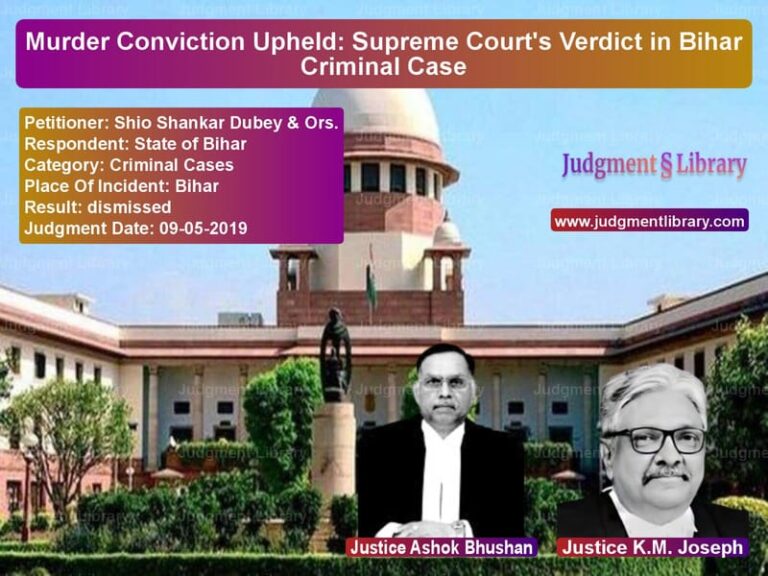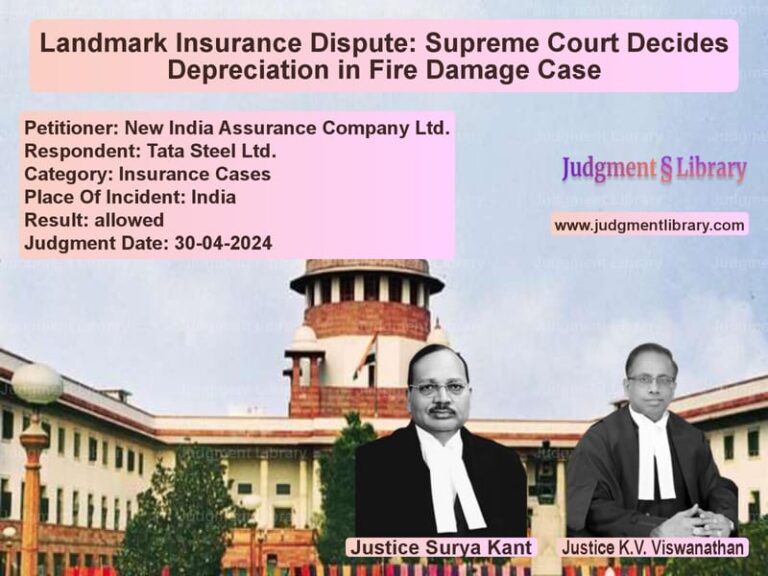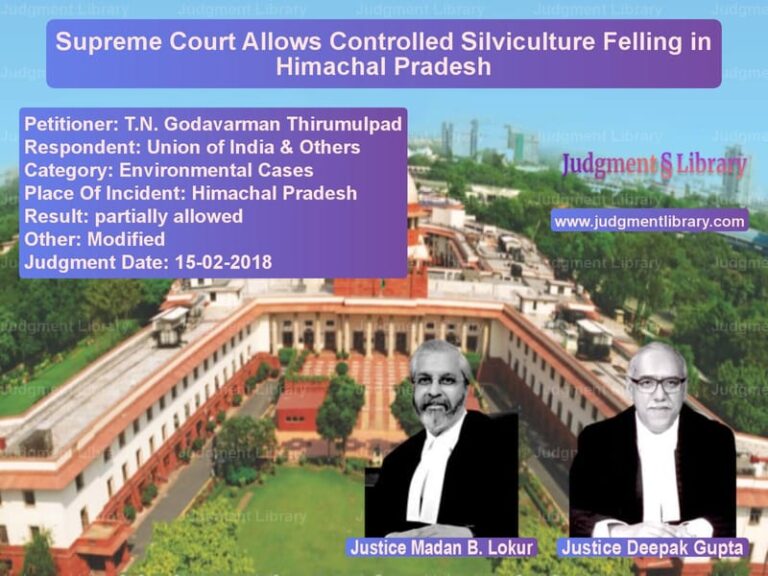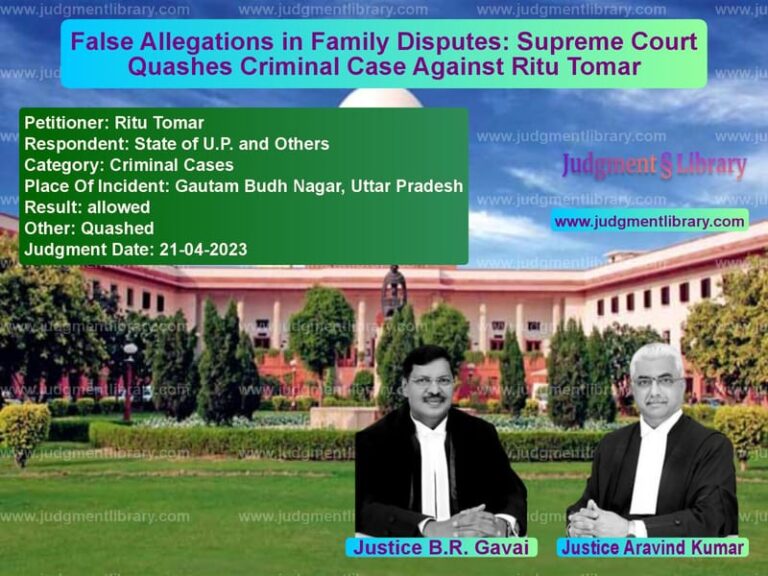Supreme Court Cancels Bail in Criminal Case: Key Legal Analysis
The present case involves a criminal appeal filed by the appellant, Zarifuddin, challenging the grant of bail to respondent no.1, Mohd. Abdul Qadir, by the Allahabad High Court. The Supreme Court was called upon to determine whether the High Court was justified in granting bail to the accused despite serious allegations and pending trial proceedings.
The judgment highlights the legal principles governing bail applications, the role of public witnesses in criminal trials, and the circumstances under which bail can be revoked. The Supreme Court ultimately set aside the bail order, ensuring the accused remained in custody while directing an expedited trial.
Background of the Case
The case arose from criminal charges against the respondent, Mohd. Abdul Qadir, who was accused of serious offenses. The prosecution had already examined nine out of nineteen witnesses, including four public witnesses. However, some of the key witnesses, including the victims, were yet to testify.
The Allahabad High Court granted bail to the accused despite the ongoing trial. Aggrieved by this decision, the appellant, Zarifuddin, approached the Supreme Court, seeking the cancellation of bail.
Legal Issues Considered
- Whether the grant of bail was justified when key witnesses, including victims, were yet to testify.
- The impact of the bail order on the fair trial process and witness testimony.
- The conditions under which a higher court can revoke bail granted by a lower court.
- The balance between the right to personal liberty and the interests of justice in serious criminal cases.
Arguments by the Appellant
- The appellant argued that granting bail at this stage would adversely affect the trial and intimidate key witnesses.
- There was a real apprehension that the accused could influence or threaten witnesses, thereby obstructing justice.
- The prosecution had already examined nine witnesses, but crucial victim testimonies were still pending.
- The accused’s release would create a situation where witnesses might not depose freely due to fear or external pressure.
- The High Court failed to consider the seriousness of the allegations and the potential impact on the trial.
Arguments by the Respondent
- The respondent contended that the right to bail is a fundamental aspect of personal liberty under Article 21 of the Constitution of India.
- He had been in custody for a significant period, and there was no compelling reason to continue his detention.
- The prosecution had already examined a majority of the witnesses, reducing the likelihood of witness tampering.
- The High Court had exercised its discretion correctly in granting bail, considering the nature of the evidence available at that stage.
- The respondent assured the court that he would not interfere with the trial proceedings or influence witnesses.
Supreme Court’s Observations
The Supreme Court, comprising Justices Sanjiv Khanna and Bela M. Trivedi, examined the relevant legal principles before delivering its ruling.
- The Court noted that some of the public witnesses and victims were yet to testify, making it crucial to ensure their safety and willingness to depose truthfully.
- Granting bail in such a situation could have a chilling effect on witness testimony, thereby affecting the fairness of the trial.
- The Court emphasized that the High Court had erred in granting bail without adequately considering the stage of the trial and the possible repercussions.
- The Court cited previous judgments where bail was revoked in similar circumstances to protect the integrity of the trial process.
- It was observed that the accused’s liberty must be balanced against the need to ensure a fair and impartial trial.
Final Judgment
The Supreme Court set aside the High Court’s order granting bail to Mohd. Abdul Qadir. The key directives included:
- The bail order was revoked, and the respondent was ordered to remain in custody.
- The trial court was directed to conclude the trial within six months.
- In case of delay beyond six months, the respondent would be allowed to file a fresh bail application, which would be decided on its merits.
- The accused and other co-accused were directed to cooperate with the trial process to ensure expeditious proceedings.
- The trial court was instructed to submit a compliance report to the Supreme Court regarding the progress of the trial.
Conclusion
This judgment reinforces the principle that bail should not be granted mechanically without considering the potential impact on the trial. The Supreme Court’s decision ensures that witnesses can testify without fear and that the judicial process remains fair and impartial.
By canceling the bail order, the Court upheld the fundamental tenets of criminal justice, emphasizing that the rights of the accused must be balanced with the interests of justice. The ruling sets a precedent for similar cases where bail is granted despite pending critical witness testimonies.
Petitioner Name: Zarifuddin.Respondent Name: Abdul Qadir & Another.Judgment By: Justice Sanjiv Khanna, Justice Bela M. Trivedi.Place Of Incident: Allahabad, Uttar Pradesh.Judgment Date: 20-09-2021.
Don’t miss out on the full details! Download the complete judgment in PDF format below and gain valuable insights instantly!
Download Judgment: zarifuddin-vs-abdul-qadir-&-anothe-supreme-court-of-india-judgment-dated-20-09-2021.pdf
Directly Download Judgment: Directly download this Judgment
See all petitions in Bail and Anticipatory Bail
See all petitions in Judgment by Sanjiv Khanna
See all petitions in Judgment by Bela M. Trivedi
See all petitions in allowed
See all petitions in Stayed
See all petitions in supreme court of India judgments September 2021
See all petitions in 2021 judgments
See all posts in Criminal Cases Category
See all allowed petitions in Criminal Cases Category
See all Dismissed petitions in Criminal Cases Category
See all partially allowed petitions in Criminal Cases Category







